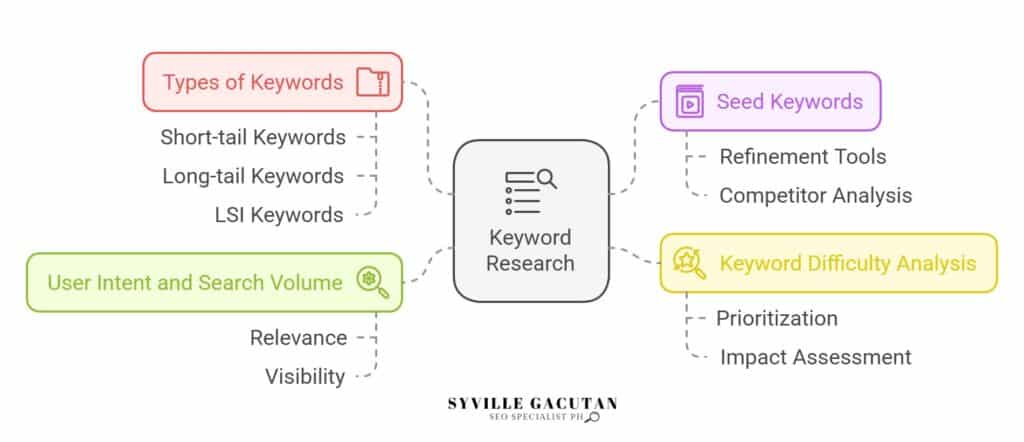
Mastering SEO: A Beginner’s Guide to Keyword Research
Perfecting SEO starts with effective keyword research, which involves identifying and analyzing search terms used by prospective customers. This process shapes content strategy by revealing specific phrases and questions that target audiences frequently search for online. By focusing on relevant keywords, businesses can stand out and connect with their audience more naturally, making interactions feel more meaningful and personal. Various types of keywords, like short-tail and long-tail, serve different roles in optimizing your content and can be discovered using tools like Google Keyword Planner and SEMrush. Using keyword research tools like Google Keyword Planner and SEMrush helps you expand and fine-tune your keyword selection, ensuring they align with your content strategy. To explore how to implement these strategies from a beginner’s guide to keyword research for SEO, further insights are available.
Key Takeaways
- Keyword research uncovers the search terms people frequently use, helping shape content strategies that fuel business growth.
- Short-tail, long-tail, and LSI keywords all serve different purposes in helping your content rank better on search engines, making it easier for people to find what they’re looking for.
- Seed keywords represent core content themes and can be refined using keyword research tools and competitor analysis.
- Conducting a keyword difficulty analysis helps prioritize terms that balance attainability with impact for your SEO goals.
- Focusing on user intent and search volume ensures keyword relevance aligns with audience needs, boosting online visibility.

What Is Keyword Research?

Keyword research is the process of finding and studying the words or phrases that people type into search engines like Google. The goal is to use this information to create content, make marketing decisions & grow a business. By understanding what people are searching for, businesses can create content that answers their questions & meets their needs. This can help attract more visitors to a website and potentially lead to more sales or conversions.
Businesses need to understand what customers are asking and why they are asking it. This important process helps companies connect with people who want to make their own choices based on good information.
At its core, keyword research is the process of uncovering the specific phrases and questions potential customers use when seeking information online. This data-driven approach forms the bedrock of effective SEO strategies.
By leveraging keyword research tools like Google Keyword Planner, Ahrefs, and SEMrush, businesses can identify keyword opportunities that align with their objectives. These tools provide insights into search volume, competition, and trends, enabling marketers to prioritize their efforts efficiently.
The importance of keyword research extends beyond merely attracting website traffic; it empowers businesses to craft content that resonates with their target audience‘s needs and desires.
When you conduct keyword research, you’re not just looking for popular terms but also understanding the context and intent behind those searches. This nuanced understanding allows for the creation of content that provides genuine value, thereby fostering a sense of trust and loyalty among users.
In today’s competitive digital landscape, mastering keyword research is indispensable. It is not just about ranking higher in search engine results but about connecting meaningfully with users who seek freedom in their choices and information.
Importance of Keywords
Understanding the importance of keyword research is like holding the compass that guides digital explorers through the vast ocean of online content. Keywords in your SEO strategy are not just simple terms; they are the crucial connectors between your content and the search intentions of your audience. Mastering search engine optimization can significantly elevate your SEO game and propel your website toward a successful campaign.
Researching keywords is fundamental to any effective SEO plan. By carefully selecting and focusing on the right search terms, you can attract a targeted audience, improve your website’s visibility, and boost user engagement. This process helps you understand what potential customers are searching for, enabling you to craft content that meets their needs and answers their questions.
These keywords serve as the foundation for creating content that is both relevant and valuable. Content aligned with what people are searching for is more likely to rank highly on search engine result pages, driving organic traffic to your website. Incorporating well-researched terms ensures your content is discoverable, builds authority, and fosters trust and credibility with your readers.
Additionally, keywords play a crucial role in optimizing various on-page SEO elements such as meta titles, meta descriptions, headers, and image alt texts. These components work together to create a seamless user experience and boost search engine rankings. Using keywords effectively not only strengthens your site’s SEO but also helps ensure users find exactly what they are looking for, reducing bounce rates and increasing conversion opportunities.
In essence, mastering keyword research is a fundamental part of any SEO strategy. It’s the key to unlocking online visibility, driving meaningful engagement, and positioning your website for long-term success.
Types of Keywords

In the realm of SEO, an assortment of keywords plays a critical role in shaping a robust strategy. Understanding the various types of keywords is essential for effective keyword research and ultimately, for crafting a powerful keyword strategy. Keywords can be broadly classified into three main categories: short-tail, long-tail, and LSI (Latent Semantic Indexing) keywords. Each type serves a unique purpose and is integral to optimizing content for search engines.
Short-tail keywords are generally 1-2 words long and are highly competitive but drive significant traffic. They are broad and often represent the initial stage of a user’s search query. Long-tail keywords, on the other hand, are more specific phrases, typically consisting of 3 or more words. They may attract less traffic individually but tend to have higher conversion rates due to their specificity. Lastly, LSI keywords are semantically related to the main keyword, helping search engines understand the context of content better, thus enhancing relevancy.
Here’s a table to illustrate these types of keywords and their characteristics:
| Type | Description | Examples |
| Short-Tail | Broad, high-traffic, highly competitive | “SEO tips”, “keyword” |
| Long-Tail | Specific, lower traffic, higher conversion rates | “best SEO tips for beginners” |
| LSI | Contextual, semantically related, improves relevancy | “search engine optimization”, “keyword analysis” |
Harnessing these types of keywords through effective keyword research tools can unlock a world of opportunities. They enable you to generate valuable keyword ideas that align with what your audience is searching for, thereby granting the freedom to dominate search engine results and achieve your SEO goals.
Finding Seed Keywords

Discovering seed keywords is a fundamental step in the SEO keyword research process, setting the foundation for a successful strategy. Seed keywords are the primary terms that represent the core of your content, products, or services. They serve as the starting point from which more specific and long-tail keywords are generated. Identifying these keywords accurately is crucial, as they guide your entire SEO campaign.
To begin finding seed keywords, start by brainstorming the main themes related to your niche. Think about what your audience is searching for and the terms they use. This initial brainstorming session will give you a broad spectrum of potential keywords to explore.
Once you have a basic list, use keyword research tools to refine and expand your ideas. Tools such as Google’s Keyword Planner or other popular options like Ahrefs and SEMrush can help you generate keyword ideas and provide valuable data on search volume and trends.
To effectively identify keyword opportunities, consider the following steps:
- Consult Your Audience: Interacting with your audience directly or through forums and social media can reveal the terms and phrases they naturally use.
- Analyze Competitor Websites: Reviewing the content and keywords used by competitors can uncover gaps and opportunities in your own strategy.
- Use Keyword Research Tools: Leverage tools like Google Keyword Planner, Ahrefs, and SEMrush to generate keyword ideas and validate your initial brainstorm.
- Review Industry Publications: Reading industry-specific blogs, reports, and publications can offer insights into trending topics and terminology.
Analyzing Keyword Competition

When delving into the intricacies of SEO, analyzing keyword competition becomes an essential step that can make or break your strategy. Understanding the landscape of keyword competition ensures that your efforts are not in vain and that your content can rise above the noise.
Keyword competition is measured by keyword difficulty, which assesses how challenging it is to rank for a specific keyword. Tools like SEMrush, Ahrefs, and Moz provide keyword difficulty scores, helping you gauge the level of effort required. High keyword difficulty implies fierce competition, whereas lower scores suggest easier opportunities for ranking.
Performing keyword research effectively requires leveraging robust keyword research tools. These tools provide valuable insights into the competition level of each keyword, allowing you to make informed decisions. Metrics such as search volume, competition score, and domain authority help paint a clear picture of the effort needed to rank for specific keywords. Here’s a comparison of some popular keyword research tools:
| Tool Name | Key Feature | Cost |
| Google Keyword Planner | Free and integrated with AdWords | Free |
| SEMrush | Comprehensive competitor analysis | Paid Plans |
| Ahrefs | Detailed backlink analysis | Paid Plans |
| Moz Keyword Explorer | User-friendly interface | Paid Plans |
| Ubersuggest | Budget-friendly with solid features | Free/Paid |
Understanding keyword difficulty is essential for setting realistic goals. High-difficulty keywords often require more time and resources to rank for, whereas low-difficulty keywords provide quicker wins. Balancing these aspects in your SEO strategies allows for both short-term gains and long-term success.
In the pursuit of online visibility, analyzing keyword competition enables you to navigate the digital landscape with precision and clarity. By focusing on attainable keywords, you can optimize your efforts and drive meaningful traffic to your site, empowering you to achieve your SEO objectives while maintaining the freedom to explore new opportunities.
Keyword Relevance
When it comes to refining your SEO strategy, honing in on keyword relevance is paramount. Keyword relevance not only determines how well your content aligns with user intent, but it also influences your search engine rankings and overall online visibility.
In the vast landscape of digital marketing, keyword research is a critical component, ensuring that the terms you target are both meaningful to your audience and strategically beneficial for your business.
To master keyword relevance, consider the following essential elements:
- User Intent: Understand what your audience is searching for and why. Aligning your keywords with user intent ensures that your content meets their needs and drives engagement.
- Search Volume: Evaluate the popularity of keywords. Higher search volumes often indicate greater interest, but they can also mean stiffer competition. Balance is key.
- Keyword Gaps: Identify keyword gaps by analyzing your competitors. Look for keywords that they rank for but you do not, and consider how you can create valuable content to fill these gaps.
- Long-Tail Keywords: Expand your keyword list by incorporating long-tail keywords. These are more specific phrases that may have lower search volumes but can attract highly targeted traffic.
Final Thoughts
Mastering keyword research is fundamental to building an effective SEO strategy. It allows businesses to connect with their audience more meaningfully by understanding their search behaviors and aligning content with their needs. From identifying the right types of keywords, such as short-tail, long-tail, and LSI, to refining strategies based on user intent and competition analysis, each step contributes to improving online visibility and driving targeted traffic.
If you’re ready to elevate your SEO strategy with expert keyword research, connect with Syville Gacutan, an experienced SEO Specialist in the Philippines. Syville can help you uncover high-performing keywords, optimize your content, and boost your website’s search engine rankings. Don’t miss the opportunity to strengthen your online presence—reach out today!